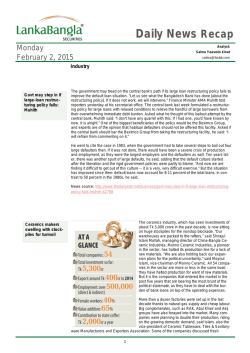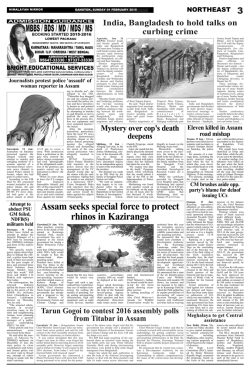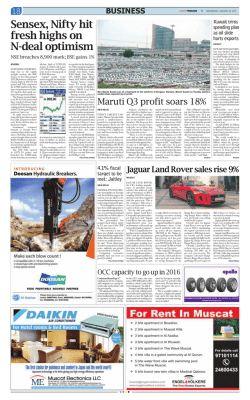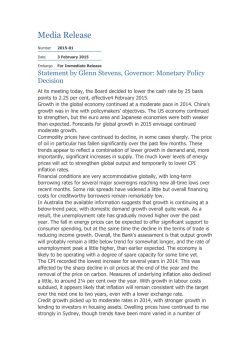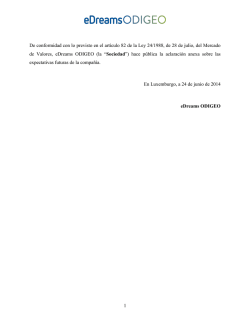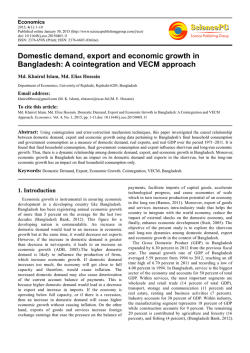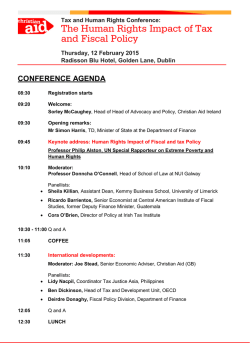
Daily News Recap
Daily News Recap Sunday February 1, 2015 Analyst: Salma Yeasmin Xinat [email protected] Industry Bangladesh Bank has now followed through on its decision to allow restructuring of large loans until June 30 with a watertight guideline for banks to ensure no further defaults on the loans. Political turmoil for the best part of last fiscal year has damaged many large borrowers' business and their debt servicing capacities. Given that the affected large borrowers have significant importance from the socio-economic and employment generation perspective, the BB board on Wednesday agreed to extend restructuring facility to them on their loans of Tk 500 crore and above. The guideline, circulated on Thursday, said the restructuring facility would only become effective after the receipt of downpayment of at least 2 percent of the outstanding amount in cash. If the outstanding amount is upwards of Tk 1,000 crore, the down payment would then be 1 percent of the sum. Strict rules for large loan restructuring The loans would have to be repaid in quarterly instalments; the failure to pay two consecutive instalments would be considered as default and the restructured facility cancelled. Incomes from the restructured loans shall be accounted for only when they are actually received. All restructured loans would be treated as special mention assets (SMAs). SMAs are potentially weak loans or assets presenting an unwarranted credit risk but are less risky than substandard assets. Assets listed for special mention generally reflect weaknesses in administration, servicing or collection. Consequently, the banks will have to keep provisioning, with the amount calculated at the existing rate for SMA along with a further 1 percent. As collateral, the banks should obtain: charge documents covering the restructured loan amounts, corporate guarantees from the business concerns of the groups and personal guarantees from all the directors/owners. They should also try to raise more physical collaterals to cover the restructured loans. The borrowers are strictly forbidden from announcing any cash dividends or making any personal drawings in the first three years of the restructured tenure. After that, they can do so but need prior consent of the banks. The banks will also have to set up special cells headed by their heads of recovery for continuous monitoring of the restructured loans. The cells would have to hand in quarterly reports, comprising compliance progress of the restructuring terms and conditions among others, to the banks' boards, who would then forward it to the central bank. Under the policy, the borrowers can also apply for new financing facility or enhancement of existing credit facility so that the repayments are made in time. The banks are allowed to extend working capital financing of up to 50 percent of the last sanctioned limit in the first three years. After that, the working capital requirement issue may be decided on the basis of banker-customer relationship and the need of the business. Term financing may be allowed up to 60 percent of the last sanctioned amount in the first five years. Beyond that, the banks have the prerogative to extend fresh term financing. In case of default, the restructured facility will be cancelled and the loan classified as per the existing policy. Banks must take all possible legal steps for recovery of such defaulted loans, failing which may result in filing suit under the Bankruptcy Act, 1997. Zahid Hussain, lead economist of the World Bank's Dhaka office, said the facility should not be extended beyond the announced 1 Daily News Recap date. If the borrowers begin to expect continuation of the facility year after year, as seen in case of black money whitening, they will lose the incentive to take all possible precautions to make sure they do not take excessive risk in using the borrowed money, he said. “This is a type of bailout attempt -- there are many such instances in other countries. On the one hand, it creates a moral hazard and on the other, it is not a permanent solution to a problem,” Nazrul Huda, former deputy governor of BB, said. “The devil is always in the details and how the policy is implemented,” Hussain said, adding that it will also be important to make sure the habitual defaulters do not hijack this window. The WB economist also said the root cause for restructuring has to be addressed. Huda reiterated the same, while calling for the formation of a dedicated cell to monitor the loans that will get the opportunity to restructure. News source: h p://www.thedailystar.net/business/strict-rules-for-large-loan-restructuring62596 Bangladesh becoming a hub for nontraditional garment products Bangladesh has become a hub for technical and non-traditional garment products as international retailers are coming with an increasing number of work orders. Bangladesh is the second largest garment exporter after China in woven and knitwear segments. Not only that, Bangladesh also supplies military uniforms, travel bags, backpacks, sleeping bags, tents, outdoor jackets, jute slippers and other jute goods. “Currently, Bangladeshi factories, especially the ones in export processing zones, are performing well in export of non-traditional items,” an official of Chittagong EPZ said, asking not to be named. Bangladeshi factories supply uniforms for the British army and French navy, the official said. Apart from non-traditional and technical garments, some factories in Chittagong EPZ produce computer accessories for renowned brands, wigs, spectacles, frames and lens of spectacles, and selection buttons of vending machines used in Western countries, the official said. “Very few people know that Bangladesh is the top exporter of army boots for some European nations. The boots are made in the factories housed in the EPZs of Chittagong,” the official said. He said Bangladesh produces high-quality ski jackets. The export prices of ski jackets, produced in the Bangladeshi EPZ factories, range between $1,200 and $1,500 apiece, he said. Bangladeshi workers, especially the female ones, are producing all these items in the factories. The factory owners, mostly foreigners, train the workers for two to three months for producing the technical products, he said. Mainly foreign investors are allowed in the EPZs to set up their factories. In recent years, many foreign investors established factories in the EPZs to produce technical and non-traditional garment items mainly due to higher cost of production in China. The US and some European countries are the main export destinations for such non-traditional and technical items, said Shahid Ullah, general manager (commercial) of HKD, a Korean company based in Chittagong EPZ. The company came to Bangladesh in 1991 and now runs three units in two EPZs in Chittagong. It exports tents worth more than $80 million a year, the factory manager told The Daily Star by phone. He said Bangladesh exports more than $100 million worth of tents a year from different factories. “The prospects for these products are bright as international retailers are coming with a lot of work orders every year,” Shahid Ullah said. Mashrul Anwar, commercial manager of Eusebio Sporting Bangladesh Ltd, a tent and sleeping bag manufacturer in Karnaphuli EPZ in Chittagong, said the demand for these non-traditional items is rising fast among Western customers. “We are also adding value to these products,” he said. 2 Daily News Recap Germany-based Commerzbank in a survey said the demand for technical and non-traditional textile items will rise 2 percent year-on-year in 2015. In the period from 2007 to 2013, the European manufacturers of technical textiles saw stronger growth than the European economy as a whole, said the survey released last month. Technical textiles are conquering more and more new application areas and are superseding conventional materials, the survey said. News source: h p://www.thedailystar.net/business/bangladesh-becoming-a-hub-for-nontradi onal-garment-products-62609 Action plan for nuclear infrastructure adopted The Russia-Bangladesh working group of the joint coordination committee for implementing the nuclear power project has adopted an action plan for nuclear infrastructure development in the country in the next two years. The working group signed two documents regarding action plan for nuclear infrastructure development and nuclear power communication strategy during a three-day meeting in the capital last month. More than 40 experts from Russia and Bangladesh took part in the discussion on various areas of nuclear infrastructure development. The action plans address the International Atomic Energy Association (IAEA) guidelines as well as needs of Bangladesh, a company insider said. Action plan for the nuclear infrastructure development includes steps that the country needs to undertake to achieve goals of the nuclear power project, nuclear safety, human resources, site selection and installation support, management, legislative and regulatory framework, electrical network, funding and financing, planning for emergencies, nuclear fuel cycle, radioactive waste management. Bangladesh's nuclear power communication strategy addresses needs to inform and educate people of the country and around Rooppur in particular about basics of nuclear energy, its benefits, safety, eco-friendliness and cost effectiveness. "The documents we signed are a positive step towards implementing the nuclear power programme for Bangladesh. Nuclear infrastructure is a vital pre-condition for establishing the nuclear power plant in the country. I am happy that we are proceeding steadily towards our dream," said head of the Bangladesh delegation and co-chair of the working group, Rabindranath Roy Chowdhury, who is also the Joint Secretary of the Ministry of Science and Technology. His Russian counterpart Yury Sokolov, Director of the department on international scientific and technical cooperation of Rosenergoatom, the power generation company of state-run Rosatom, said, "With a long experience in the nuclear industry, we have worked out with Bangladeshi partners the action plans which I believe completely correspond to their needs and at the same time, to the guidelines set by IAEA." News source: http://www.thefinancialexpress-bd.com/2015/02/01/78795 3 Daily News Recap Public hearing on gas price hike opens Monday Bangladesh Energy Regulatory Commission (BERC) opens tomorrow (Monday) a four-day public hearing on proposed raise in natural gas tariffs and wheeling charge. State-owned gasmarketing and-distribution companies have sought the hike in tariff rates as much by 122 per cent for the end-users. During the hearings, officials said, the regulator is set to consider the tariff-hike proposals on the basis of already-fixed asset value of natural gas, for the first time ever. The Energy and Mineral Resources Division (EMRD) under the Ministry of Power, Energy and Mineral Resources has already fixed asset value of the natural gas at Tk 25 per Mcf (1,000 cubic feet) from previous 'zero' for appraising the worth of this fossil fuel. Fixing value of the natural wealth was never done before. The BERC did not calculate any asset value of gas before for fixing its tariffs before. Only the upstream and downstream costs and the costs against the purchase of gas shares of the international oil companies (IOCs) used to be taken into account. As per schedule, the public hearing for raising wheeling charge against the proposal of state-run Gas Transmission Company LTd (GTCL) will be held on February 2. Public hearings for Titas Gas Transmission and Distribution Company Ltd and Pashchimanchol Gas Company Ltd will be held on February 3. Bakhrabad Gas Distribution Company Ltd and Karnaphuli Gas Distribution Company Ltd will face public hearings on February 4. And the price-hike pleas of Jalalabad Gas Transmission and Distribution Systems Ltd and Sundarban Gas Company Ltd will come up for hearing on February 5. News source: http://www.thefinancialexpress-bd.com/2015/02/01/78796 FDI likely in RMG outside EPZs with no string attached The government will soon take a decision on allowing foreign investment in readymade garment (RMG) industry outside the export processing zones (EPZs) without any conditions, a move that has been vehemently opposed by local apparel industry owners. The Ministry of Commerce (MoC) will convene a meeting next week with stakeholders to settle the issue of allowing foreign investment outside the EPZs in both high-fashioned and basic garments, according to officials concerned. Stakeholders in October last had agreed to accept foreign investment outside the EPZs provided those factories will produce fashion items and export those in non-traditional and new markets like Russia, Brazil, China, South Africa, India, Australia and Mexico. Officials said, the government is under pressure from several countries to allow FDI in basic garments without any condition. "We will sit with the stakeholders next week to settle the issue," Commerce Secretary Hedayetullah Al Mamoon told the FE without elaborating. A senior MoC official told the FE months back stakeholders at a meeting with officials of the Export Promotion Bureau (EPB) had agreed on conditional acceptance of FDI in the RMG sector outside the EPZs. "But immense pressure is there to accept FDI in RMG sector without imposing any condition. Foreigners want to invest in basic garment production as well," he said. He said the EPB has forwarded the new proposal to the ministry concerned for decision-making since they could not convince the stakeholders to allow FDI in low-end garment items. "We will have to take a decision immediately. Our Prime Minister had to face questions on this issue during her several overseas visits," said the official preferring anonymity. Vice-President of Bangladesh Garment Manufacturers and Exporters Association (BGMEA) Shahidullah Azim told the FE Friday that allowing foreigners in low-end garment items will create chaos in the industry. Referring to previous experience, Mr Azim said some joint venture factories, located outside the EPZs, had paid excess wages to their workers which the nearest other local factories could not afford. As a result, workers of local factories, who were getting wages according to the government wage structure, had demanded additional pay. This led to labour unrest. "We 4 Daily News Recap are good enough to produce basic garments. Interested foreigners can invest in fashion items as well as backward linkage industries," he said adding local garment-makers won't accept foreign investment in basic items. Officials said, the Bangladesh Garment Manufacturers and Exporters Association (BGMEA) and the Bangladesh Knitwear Manufacturers and Exporters Association (BKMEA) are entitled to provide utilisation declaration (UD) certificates for RMG factories. The two trade bodies have been issuing UD certificates to their member-factories only. The two trade bodies do not issue UD certificates to factories having foreign investments on grounds that such investment outside the EPZs would pose threat to the local RMG industry. According to the law of the land, membership of the concerned associations and UD certificates are a must for the export-oriented factories to import raw materials under bonded-warehouse facility. News source: http://www.thefinancialexpress-bd.com/2015/01/31/78622 Economy BB to continue 'cautious' monetary policy for H2 The Bangladesh Bank (BB) will continue its existing 'cautious' monetary policy for the second half (H2) of the ongoing fiscal year (FY) 2014-15 with an aim to maximise economic growth by curbing inflationary pressure on the economy. "The cautious monetary policy stance of H1 FY 15 will remain unchanged in H2 of FY15 without any new loosening or tightening," BB Governor Atiur Rahman said while formally announcing the monetary polity statement (MPS) for the January -June period of this fiscal at a press conference held at the central bank headquarters in Dhaka Thursday. The central bank chief also said the BB will also maintain continuity and further strengthen the momentum of investment-friendly reforms in credit and financial policies accompanying the monetary policy in the H2 of FY 15 towards enhancing effectiveness of the financial markets as transmission channels. The BB is going to introduce a rebate policy for rewarding regular borrowers, the central bank governor said. "I instructed the BRPD (Banking Regulation and Policy Department) department on Wednesday to formulate a policy in this connection," he disclosed this while answering a query. Talking to the FE, a BB senior official said the BRPD is now making preparation to formulate the policy. "We're working for all, not for a certain quarter or group," the BB governor said while replying to another query relating to the new large loan restructuring policy. He also said no borrower will be eligible for such restructuring facility if he or she is found involved in any forgery or malpractice. After restructuring, if any borrower fails to repay two consecutive instalments of their loans, then such facility will be cancelled, he added. "The policy will help increase profitability of banks through reducing their amount of classified loans," SK Sur Chowdhury, deputy governor of the BB, said, adding that it will also help create employment opportunities. Regarding monitoring and supervisions, Dr Rahman said the BB's supervisory oversight on credit disbursement and loan recovery disciplines in banks and financial institutions will intensify. There will be particular emphasis on risk management, internal audit and internal controls, accountability and transparency, he added. "Besides firmly discouraging abetting of habitual, wilful repayment default, creating room for helping out recovery of genuine businesses 5 Daily News Recap distressed by circumstances beyond their control with realistic debt restructuring in line with best international practices is under the BB's careful consideration," he noted. The ceiling for private sector credit growth remained unchanged at 15.5 per cent for the H2 of FY 15 while public sector including the government re-fixed it at 25.3 per cent from 24.8 per cent earlier. Private sector credit will have space for 15.5 per cent growth, a level substantially higher than the 12.7 per cent November 2014 level, according to the BB governor. "We're ready to increase the ceiling of private sector credit growth in line with requirement," Dr Rahman said while replying News source: http://www.thefinancialexpress-bd.com/2015/01/30/78498 Inflation eases slightly in Dec The country's inflation as measured by consumers' price index (CPI) eased slightly in the month of December last on both the point-to-point and 12-month average basis mainly because of decrease in prices of food items. The inflation rate came down to 6.11 per cent in December 2014 from 6.21 per cent of the previous month on the point-to-point basis, according to the Bangladesh Bureau of Statistics (BBS) data. On the other hand, the annual average inflation fell to 6.99 per cent in December last from 7.10 per cent of the previous month. "The CPI inflation decline is, however, mainly from the food component of the consumption basket. Core (non-food, non-fuel) CPI inflation has been on somewhat upward edging trend in November and December 2014," the BB governor explained. He also said progress in bringing annual average CPI inflation down from 7.35 per cent at the beginning of FY 15 to 6.5 per cent by June 2015 is broadly satisfactory, with 6.99 per cent level by the close of the H1 of FY 15. The central bank governor hoped that the MPS for the H2 of FY 15 would play the same effective role as the previous one in instilling and strengthening public confidence on the BB's actions aimed at containing and stabilising CPI inflation. He also believed that its attendant inclusive, environmental sustainability supportive credit and financial policies would make meaningful contribution in supporting the government's pursuit of inclusive, environmentally sustainable growth and poverty eradication on the country's path towards prosperity. The central bank projected that the country's overall trade deficit might rise to US$9.91 billion by the end of the FY 15 from $6.81 billion in the previous fiscal. The current account deficit might reach $1.35 billion in the FY 15 from $1.35 billion surplus a year ago. The country's current account balance entered into negative territory in the month of September 2014 due to higher landed imports, a BB official said. The overall balance of payments (BoP) may come down to $642 million in the FY 15 from $5.48 billion in the previous fiscal, according to the BB's latest projection. BB Change Management Advisor Allah Malik Kazemi and Chief Economist Biru Pakska Paul also spoke on the occasion. News source: http://www.thefinancialexpress-bd.com/2015/01/30/78487 6 Daily News Recap BD fails to qualify for US MCA fund again Bangladesh has failed to qualify again for the Millennium Challenge Account (MCA) fund of the USA this year due to its failure in improving the 'control of corruption' index, officials said Friday. Its neighbour Nepal, however, has qualified for the 2015 fund in the latest review made last month for its better performance in several indicators. It remains the only eligible South Asian country to get funds from the US government to cut poverty. MCA is a fund administrated by an independent US government agency Millennium Challenge Corporation (MCC) for the poor countries to facilitate cutting poverty and improving social conditions. Ministry of Finance (MoF) officials said Bangladesh has been trying for past many years to qualify for the fund under the MCA. "Although Bangladesh's position has been improved in freedom of the people's rights, child health and elimination of gender disparity, it has failed to curb corruption to a satisfactory level. So, the country has not been eligible for the USA fund," a senior Ministry of Finance (MoF) official told the FE Friday. He said if a country wants to qualify for the MCA fund, it will have to improve three broad indexes - 'Ruling Justly', 'Encouraging Economic Freedom', and 'Investing in People'. Under the broad index, a country has to improve 'Control of Corruption', 'Democratic Rights' and at least half of remaining small indexes. An Economic Relations Division (ERD) official said Bangladesh has done a good job in the last two indexes while failed to comply with the first one (Control of Corruption). Among the 20 sub-categories of the three broad indexes, Bangladesh has failed to improve the indicators including control of corruption, health expenditure, primary education expenditure, national resources protection, fiscal policy, regulatory quality, trade policy, land rights and access and access to credit. It, however, has been able to comply with 11 remaining indicators including immunisation rates, girls' primary education completion rate, child health, political rights, civil rights, freedom of information, government effectiveness, rule of law, business start-up, gender in the economy, and inflation. The Board of the MCC in December last selected Mongolia, Nepal, and the Philippines as eligible for such assistance for FY 2015. Another ERD official said although the fund is not so significant in amount for Bangladesh, its eligibility could send a good message to the world community about the country's better environment for business and investment. Established in 2004, the MCA is an innovative foreign assistance programme designed to reduce poverty in developing countries through sustainable economic growth. Every year, the MCC Board of Directors meets to select countries for MCA assistance. News source: http://www.thefinancialexpress-bd.com/2015/02/01/78792 Political instability to take toll on private investment, fears UO The Unnayan Onneshan (UO), independent multidisciplinary think-tank, has cautioned that the trend of shortfall in the target of growth in private sector credit may further worsen the sluggish rate of private investment triggered by current political instability, reports UNB. As a result, it said the rate of growth in gross domestic product (GDP) might not reach the target of 7.3 per cent in fiscal year (FY) 2014-15. The UO in its rapid assessment of recently announced monetary policy statement for the second half of the FY 2014-2015 revealed that the growth in private sector credit may fall short of target in view of the observed trend of unachieved targets in previous occasions. The UO said this in its January issue of Bangladesh Economic Update 2015. The research organisation further elaborates that until November of FY 2014-15 when the political unrest did not reach the current level, the Bangladesh Bank remained far away from its target of 14 per cent growth in private sector credit set for the period of JulyDecember of FY 2014-15. 7 Daily News Recap The target of 15.5 per cent for the January-June period of FY 2014-15, therefore, seems to be unrealistic amidst the current state of severe political uncertainty since January 2015. Referring to the gap between the targets and actual credit growth of private sector, the UO demonstrated that the rate of growth in private sector credit became 12.7 per cent in November of FY 2014-15 against the target of 14 per cent. Similarly, the rate of private sector credit growth was calculated at 10.8 per cent and 12.3 per cent during FY 2012-13 and FY 2013-2014 respectively against the target of 18.5 per cent and 16.5 per cent respectively, it added. It said that the "cautiously restrained" policy may face the challenges of increasing real interest rate due to the recent discrepancies between the decrease in inflation rate and the decrease in nominal interest rate, commented the research organisation. Referring to persistent deterioration in the financial portfolio of the state-owned banks, the research organisation showed that the government plans to allocate Tk 60 billion to the four state-owned banks in FY 2014-15, which was Tk 41 billion in December of FY 2013-14 representing a increase of 46.34 per cent. The shortfalls in capital in the banking sector can largely be attributed to the inefficiency in the sector caused by slack surveillance, frequent incidence of scam and fraudulence, captured governance, and poor risk management, added the UO. Calling for a cautious harmonisation of fiscal and monetary policies that would cause both the money and fiscal multiplier to work in the economy and channel adequate resources for the expansion of productive capacities, the UO urged for an inclusive political dialogue between the political parties that would create a stable investment climate and increase the private investment by restoring business confidence and cause the national output to grow at 6.26 per cent in FY 2014-15, as projected by the UO. News source: h p://www.thefinancialexpress-bd.com/2015/02/01/78719 Current account deficit likely for 1st time in 2 years The current account balance is likely to plunge to deficit for the first time in two years in the current fiscal year with imports exceeding exports. The deficit is projected to be $1,348m in the fiscal year 2014-15, according to the latest monetary policy statement. Until the first quarter of the fiscal, the current account had been in the black since FY2011-12. The current account balance recorded a deficit of $1,316m during the July-November period of 2014 compared to a surplus of $1,127m in the same period a year ago, according to the Bangladesh Bank data. “The current account balance was negative during the period, particularly owing to import growth outstripping export growth,” said the central bank statement. On projection of current account for this fiscal, it said there will be a correction in the pace of export growth as the existing outcome of export earnings appears to be the lag effect of cancellation of garments order followed by political deadlock in the first half of current fiscal year and collapse of Rana Plaza, along with a pick-up in imports as investor confidence grows. Imports rose by 11.59% to $17.8bn in the first half of this fiscal when exports rose 1.56% to $14.91bn compared to the same period a year earlier, according to the Export Promotion Bureau. A banker said imports might increase further with the start of Padma Bridge construction works, the country’s largest infrastructural project. Political unrest might dampen export growth, which would put the balance of payments under pressure in future, he added. For this fiscal year, the central bank projects an overall export growth of 8%, import 15% and remittance 12%, which will lead to having a reasonable balance of payment surplus. However, starting from FY2015 in order to retain external sector stability it will be important for export and growth to pick up as imports are likely to grow further, Bangladesh Bank said in policy statement. 8 Daily News Recap “This will require coordinated activities to boost export diversification, change in destination, manpower exports, upgrading skills of migrants and enhanced incentives to use formal channels to remit and invest funds. Bangladesh Bank will continue its efforts in this regard,” it said. Despite a reasonable remittance growth of more than 10% in the first six months of this fiscal year, the deficits in trade balance ($4.48bn), services account ($2.05bn) and primary income account ($1.21bn) exacerbate the current account balance to a deficit, according to BB. It said fortunately, remittances and other secondary income to the tune of $17bn are expected to cushion against the deficits of trade, services, and primary income, limiting the amount of current account deficit to $1.35bn for FY2015 – which appears to be normal and serviceable for a growing economy like Bangladesh. Aiming at keeping exchange rate stable, Bangladesh Bank will continue to buy greenback. “Intervention in the foreign exchange market have protected exporters by slowing the appreciation or in turn, helping depreciation of the taka.” The central bank anticipates further buildup in foreign exchange reserves in the second half of FY2015 though at a more moderate pace than FY2014 due to the balance of payments assumptions. Foreign currency reserves are hovering over around $22bn – enough to cover imports of more than six months. After a period of appreciation since early 2012, the exchange rate remained stable since mid-2013. News source: http://www.dhakatribune.com/business/2015/feb/01/current-account-deficitlikely-1st-time-2-years#sthash.S60CXZJo.dpuf FY15 exports may fall short of target Bangladesh is unlikely to reach its export target set for the current fiscal year in the wake of the prevailing political unrest that has already undertaken heavy toll on the country’s economy. The government has set US$33.2bn export target for the fiscal year 2014-15 to earn $27.5bn from the nation’s potential garment sector. The target is 8.85% higher than that of the last year’s earning of $30.19bn. According to Export Promotion Bureau (EPB), in the first half of the current fiscal year, Bangladesh earned $14.9bn, which is 4.42% less than that of the export target of $15.6bn for the period. On the other hand, the export growth had showed a slower trend to 1.56% in July-December period, the lowest in the last five year. In the first half of the current fiscal year, Bangladesh has witnessed over 1.5% growth against the target of around 10%, former finance adviser to a care taker government ABM Mirza Azizul Islam told the Dhaka Tribune. “If we want to meet the target, we have to achieve over 15% growth in next six month, which is not possible due to the ongoing political unrest as it has already disrupted both the supply and the demand sides,” said Islam. In this regard, he also reminded that the buyers were unwilling to place orders in Bangladesh amid political unrest. “The export target for the FY201415 is under great threat due to the ongoing political turmoil since January 5 and if the present situation does not improve, it will be quite impossible to meet the target,’’ Mohammad Hatem, former first vice president of Bangladesh Knitwear Manufacturers and Exporters Association (BKMEA), told the Dhaka Tribune. A confirmed order worth $3.8m has finally been withdrawn as the buyer is not willing to take any risk placing orders in Bangladesh under the current state of political unrest, he added. If there is not enough work orders for the export-oriented industry, especially the apparel industry, how come it would be possible for us to ship the products under police escort? questioned an exporter, commenting on the government’s initiative to keep the supply and delivery chain smooth at any cost. The country’s supply chain has been shattered since 5 January and if it continues any further, production at the export oriented factories will come to a halt, he added. After the X-mas, it is the high time for the buyers to place orders but they are placing at least 30% to 40% less orders due to the political unrest, he further said. As there is no sufficient orders, a good number of factory owners is running their factories partly, said BGMEA 9 Daily News Recap Vice President Shahidullah Azim. “It would be quite impossible to reach the export target by any means under the current situation and consequently, it would badly hit the export target of $50bn by 2021,” he added. According to Bangladesh Garment Manufacturers and Exporters Association (BGMEA), the RMG sector has lost more than 30% orders as the buyers are not even coming to Bangladesh to place their orders. Bangladesh mainly depends on garment, leather, agricultural products, shrimp and jute and jute goods to achieve its export target. Among the major export sectors, Knitwear sector failed to reach the target by 2.41% followed by Woven 7.27%, leather and leather products 12.80%, home textile 7.19%, specialised textile 12%, frozen fish 10.47% while vegetable 26%. News source: http://www.dhakatribune.com/business/2015/feb/01/fy15-exports-may-fall-shorttarget#sthash.u9VmhZug.dpuf Capital Market Performance-based management fees for AMCs in the offing The Bangladesh Securities and Exchange Commission is planning to set performance-based management fees for asset management companies of mutual funds in line with its effort to pressurise the entities to improve performance, a BSEC senior official has told New Age recently. In the existing mutual fund rules AMCs get regular fees for managing the mutual funds indiscriminating their performance in terms of how much the mutual funds are offering dividends to their unit holder, he said. Due to the legal constrain, AMCs have no urge in improving performance of the mutual funds, the official said. Some of the mutual funds are investing funds based on their personal interest, he said. Due to the BSEC’s tough monitoring over the mutual funds, the performance of the mutual funds have improved a bit in 2014, but, except a few, almost all the mutual funds have declared less than 15 per cent dividend to their unit holders which have failed to lure investors, the official said. Considering all of these, the commission has decided to amend the mutual fund rules setting performance-based management fees for the asset managers, he said. The commission might set a standard dividend return ratio that must be ensured by the AMCs for entitlement of regular management fees, the official said. Issuance of dividends less than the specified percentage will result deduction of management fees, he said. Another BSEC official said that the commission might amend the mutual fund rules keeping scope for penalising the AMCs. Experts on mutual funds say that lack of investment instrument, managerial capability and imprudence of the asset managers are the main constrain in making funds for investment. In December last year, the capital market regulator issued letters to the custodians of mutual funds asking the entities to submit details of the MFs’ assets under their custody within January 20, 2015. The commission in the last couple of years had taken several steps to make the ailing mutual fund sector vibrant by ensuring proper function of the mutual fund-related organisations, a BSEC official said. In line with the commission’s previous actions, verifying assets of the mutual funds will help the commission find out irregularities done by the mutual fund-related entities, he said. After the market crash in 2010-2011 most of the mutual funds failed to offer dividend to their unit 10 Daily News Recap holders that put a negative impact on the overall mutual fund sector. Due to the investors’ negative perception about the mutual funds, most of funds are now trading at the stock exchanges below their net asset values per unit, the official said. The commission’s actions against the asset managers, trustee and custodians of the mutual funds might improve performances of the funds and restore investors’ confidence, he said.Seventeen asset managers are operating 40 mutual funds listed with the capital market. New source: http://newagebd.net/90719/performance-based-management-fees-for-amcs-inthe-offing/#sthash.WJn0AKvh.dpbs BD contributes notably to Asian Frontier Fund Despite having a sluggish performance in the domestic stock market, Bangladesh emerged as a leading 'return contributor' for Asian Frontier Fund (AFF) in last year. Hong Kong-based Asia Frontier Capital (AFC) Limited is a fund management company specialises in investing in high growth Asian frontier economies by managing the AFC Asian Frontier Fund and the AFC Vietnam Fund. 'Breaking down 2014 performance country wise, on a gross return basis, the leading return contributors within fund were Pakistan, Vietnam, Bangladesh and Sri Lanka, in that order,' said the annual review of the AFC, revealed second week in January this year. The review report also mentioned that these four countries make up 68 percent of AFC's fund as of December 2014 and historically these four countries have been a majority of the portfolio. The fund puts around 13 per cent of it's total investment to Bangladesh market, the data reveals. The report also refers to five stocks which provided the highest returns on investment without mentioning specific names. These are: a pharmaceutical, a consumer beverage and a tobacco company from Pakistan; a pharmaceutical company from Bangladesh, and a consumerfocused conglomerate from Sri Lanka. 'All of these five companies were part of our top 20 holdings during the year except for the Pakistani tobacco company, which we exited and booked profit on in the beginning of second quarter,' said the report. The first one invests in public equities of Asian frontier countries that are seeing increasing consumption due to favourable demographic trends, rising incomes and high economic growth. The fund invests in listed equities of companies that have their principal business activities in Bangladesh and 12 other countries. Less advanced capital markets from the developing world are known as frontier markets. They have invest-able stock markets that are less established than those in the emerging markets like China and India. Bangladesh's Outlook Better The AFF expects better return from Bangladesh in this year taking the political risk in consideration. 'Political protests can be an issue going forward but these events have occurred in the past as well and companies have continued to deliver numbers,' said AFF. On it's outlook, it 11 Daily News Recap also said, 'The beginning of 2014 witnessed political protests due to the election period, but things have stabilised since then. We continue to like Bangladesh as we think it provides a good consumer story with a population of close to 160 million and a GDP/capita of $1,100.' According to AFF, consumer companies in the country will be benefited due to rise in income level in future. 'Therefore we like the long term story of consumer related stocks in Bangladesh. We think lower crude oil prices will be a positive for the economy and also for consumer stocks in general.' AFF also underscored the macroeconomic performance of Bangladesh and termed it better compare to Pakistan and Sri Lanka as the country has managed to have a current account surplus through increased exports, kept its fiscal deficit under control (3.4 percent of GDP), and has not built up high levels of government debt (35 percent of GDP). The fund, however, put a note of caution on future investment as it said, 'Valuations are not cheap in Bangladesh and we will need to be selective in our investments.' News source: h p://www.thefinancialexpress-bd.com/2015/01/30/78428 BBs liquidity support for capital market continues Bangladesh Bank (BB) has continued liquidity support for capital market in accordance with the banks' permissible limit along with ensuring their compliance set in laws and regulations, officials said. BB Governor Dr. Atiur Rahman Thursday said this in his speech while unveiling the Monetary Policy for January-June, 2015. "Amid the attention to financial markets stability, the BB's attention in support of capital market stability will also continue in the second half of FY2015," Atiur said. He said the central bank has the statutory responsibility of enforcing compliance of banks with the legal limits on their capital market exposures. "Further to this, the BB has continued liquidity support for capital market transactions in volumes permissible within the central bank's monetary programs," the governor said. While mentioning the government's initiative in lessening burden of investors affected during the 2010-11 stock market debacle, Dr. Atiur said the central bank played instrumental role in structuring the refinancing program supporting capital market activities. "BB will continue its supportive role in capital market developments to the feasible within laws and regulations," the governor said. At the press the newsmen raised question about the facility provided to large loan defaulters amid sufferings of thousands of affected investors of the capital market. In this regard, the governor said the central bank has already disbursed Tk 6.0 billion of the capital market re-financing scheme. "We are also sitting with the stakeholders of the capital market once in every three months," the governor said. The ministry of finance (MoF) earlier stressed on proper coordination among the regulators of the capital market and other ones ahead of taking any decision that could affect the stock market. In this regard, BB Governor Dr. Atiur said the central bank is engaging regularly with capital market and other financial system regulators in quarterly policy coordination meetings. "In the first half of FY2015, the central bank has introduced a number of new investor friendly regulatory reforms facilitating external transactions of foreign and local businesses including investors in the capital market." The governor also said due to reform brought in rules, foreign equity investments made in unlisted local companies can now be sold to local investors at market based prices rather than at net asset value. "I hope the monetary policy declared Thursday will play a key role observed earlier for the sustainability of the money and capital market," the governor added. News source: http://www.thefinancialexpress-bd.com/2015/01/30/78429 12 Daily News Recap LBSL’s research reports are also available on Bloomberg LANB <GO> http://lankabangla.duinvest.com Disclaimer This document (“the Report”) is published by LankaBangla Securities Ltd (“LBSL”) for information only of its clients. All information and analysis in this Report have been compiled from and analyzed on the basis of LBSL’s own research of publicly available documentation and information. LBSL has prepared the Report solely for informational purposes and consistent with Rules and regulations of SEC. The information provided in the Report is not intended to, and does not encompass all the factors to be considered in a best execution analysis and related order routing determinations. LBSL does not represent, warrant, or guarantee that the Report is accurate. LBSL disclaims liability for any direct, indirect, punitive, special, consequential, or incidental damages related to the Reports or the use of the Report. The information and analysis provided in the Report may be impacted by market data system outages or errors, both internal and external, and affected by frequent movement of market and events. Certain assumptions have been made in preparing the Report, and changes to the assumptions may have a material impact on results. The Report does not endorse or recommend any particular security or market participant. LBSL, its analysts and officers confirm that they have not received and will not receive any direct or indirect compensation in exchange for expressing any specific recommendation, opinion or views in its Report. The information and data provided herein is the exclusive property of LBSL and cannot be redistributed in any form or manner without the prior written consent of LBSL. This disclaimer applies to the Report in their entirety, irrespective of whether the Report is used or viewed in whole or in part. LBSL Capital Market Research Department Md. Mahfuzur Rahman Research In-Charge [email protected] Analyst Designation E-mail Qazi Musaddeq Ahmed, CFA Senior Research Analyst [email protected] Maksudul Haque Chowdhury Senior Research Analyst [email protected] Nazmul Ehsan Omiya Research Associate [email protected] Nazib Haider Chowdhury Research Associate [email protected] Salma Yeasmin Xinat Research Associate [email protected] Md. Mahfujur Rahman Research Associate [email protected] Pritam Saha Research Associate [email protected] Md. Rezwanur Rahman Research Associate [email protected] Institutional & Foreign Trade Department Rehan Muhammad Manager [email protected]/rmuhammad1@bloomberg .net LankaBangla Securities Limited Research & Analysis Department Corporate Office A.A. Bhaban (Level-5) 23 Motijheel C/A Dhaka-1000, Bangladesh Phone: +880-2-9513794 (Ext-118) Fax: +880-2-9563902 Website: www.lbsbd.com 13
© Copyright 2026

